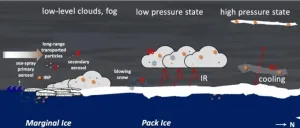Climate change: Erratic weather slows down the economy
2021-02-08
(Press-News.org) If temperature varies strongly from day to day, the economy grows less. Through these seemingly small variations climate change may have strong effects on economic growth. This shows data analyzed by researchers from the Potsdam Institute for Climate Impact Research (PIK), Columbia University and the Mercator Research Institute on Global Commons and Climate Change (MCC). In a new study in Nature Climate Change, they juxtapose observed daily temperature changes with economic data from more than 1,500 regions worldwide over 40 years - with startling results.
"We have known for a while that changes in annual mean temperature impacts macroeconomic growth," explains lead author Maximilian Kotz from PIK. "Yet now, for the first time, we're also able to show that day-to-day variations in temperature, i.e. short-term variability, has a substantial impact. If this variability increases by one degree Celsius, economic growth is reduced on average by 5 percentage-points."
Particularly affected are economies in low-income regions of the global South, as co-author Leonie Wenz from PIK explains: "We find that familiarity with temperature variations is important: Economies in Canada or Russia, where average monthly temperature varies by more than 40°C within a year, seem better prepared to cope with daily temperature fluctuations than low-latitude regions such as parts of Latin America or Southeast Asia, where seasonal temperature differences can be as small as 3°C. This is likely because farmers and small business owners have cultivated resilience against temperature variability."
"Furthermore, income protects against losses," Wenz adds. "Even if at similar latitude, economies in poor regions are more strongly affected when daily temperature fluctuates than their counterparts in rich regions." If the daily temperature deviates from seasonal expectations, fundamental elements of the economy are negatively impacted - including crop yields, human health, sales and operational costs.
Comparing each year's day-to-day temperature variability between 1979 and 2018 with the corresponding regional economic data, the researchers analyzed a total of 29,000 individual observations. "Rapid temperature variability is something completely different than long-term changes," explains Co-Author Anders Levermann from PIK and Columbia University, New York.
"The real problem caused by a changing climate are the unexpected impacts, because they are more difficult to adapt to. Farmers and other businesses around the world have started to adapt to climate change. But what if weather becomes simply more erratic and unpredictable? What we have shown is that erratic weather slows down the economy. Policy makers and industry need to take this into account when discussing the real cost of climate change."
INFORMATION:
Article: Maximilian Kotz, Leonie Wenz, Annika Stechemesser, Matthias Kalkuhl, Anders Levermann: Day-to-Day Temperature Variability Reduces Economic Growth. Nature Climate Change. DOI: 10.1038/s41558-020-00985-5.
ELSE PRESS RELEASES FROM THIS DATE:
2021-02-08
Negishi cross-coupling reactions have been widely used to form C-C bonds since the 1970s and are often perceived as the result of two metals (i.e zinc and palladium/nickel) working in synergy. But like all relationships, there is more under the surface than what we first expected. PhD student Craig Day and Dr. Rosie Somerville from the Martin group at ICIQ have delved into the Negishi cross-coupling of aryl esters using nickel catalysis to understand how this reaction works at the molecular level and how to improve it. The results have been published in Nature Catalysis.
Compared to palladium, nickel has the advantage of being readily available transition metal, ...
2021-02-08
It's clear that rising greenhouse gas emissions are the main driver of global warming. But on a regional level, several other factors are at play. That's especially true in the Arctic - a massive oceanic region around the North Pole which is warming two to three times faster than the rest of the planet. One consequence of the melting of the Arctic ice cap is a reduction in albedo, which is the capacity of surfaces to reflect a certain amount of solar radiation. Earth's bright surfaces like glaciers, snow and clouds have a high reflectivity. As snow and ice decrease, albedo decreases and more radiation is absorbed by the Earth, leading to a rise in ...
2021-02-08
What The Study Did: Researchers investigated the association between the use of proton pump inhibitors among children and adolescents in Sweden and the risk of asthma.
Authors: Yun-Han Wang, M.Sc., B.Pharm., of the Karolinska Institutet in Stockholm, is the corresponding author.
To access the embargoed study: Visit our For The Media website at this link https://media.jamanetwork.com/
(doi:10.1001/jamapediatrics.2020.5710)
Editor's Note: The article includes conflict of interest and funding/support disclosures. Please see the article for additional information, including other authors, author contributions and affiliations, conflict ...
2021-02-08
What The Article Says: In this essay, the authors describe a 97-year-old patient who learned to titrate condensed chicken soup like a medicine during the COVID-19 pandemic.
Authors: Yuenting Diana Kwong, M.D., M.A.S., University of California, San Francisco, is the corresponding author.
To access the embargoed study: Visit our For The Media website at this link https://media.jamanetwork.com/
(doi:10.1001/jamainternmed.2020.8897)
Editor's Note: The article includes conflicts of interest disclosures. Please see the article for additional information, including other authors, author contributions and affiliations, conflict of interest and financial disclosures, ...
2021-02-08
What The Study Did: Salary information from faculty at U.S. medical schools was used to examine the association between the percentage of female clinicians in a medical specialty and the average and median salaries for that specialty.
Authors: Terrill Bravender, M.D., M.P.H., of the University of Michigan in Ann Arbor, is the corresponding author.
To access the embargoed study: Visit our For The Media website at this link https://media.jamanetwork.com/
(doi:10.1001/jamapediatrics.2020.5683)
Editor's Note: The article includes conflict of interest disclosures. Please see the article for additional information, including other authors, author ...
2021-02-08
Coral reefs are beautiful and diverse ecosystems that power the economies of many coastal communities. They're also facing threats that are driving their decline, including the planet's warming waters.
This threat hit extreme levels in 2015, when high temperatures were turning corals white around the globe. Kaneohe Bay in Hawaii was hit hard; nearly half of its corals bleached.
Hidden in the aftermath of this extreme event, however, were biochemical clues as to why some corals bleached while others were resistant, information that could help reefs better weather warming waters in the future. These clues have now been uncovered by researchers at Michigan State University and the University of Hawaii at Manoa.
"It was kind of horrifying," said coral biologist Crawford Drury, who witnessed ...
2021-02-08
Researchers at the University of Massachusetts Amherst have gained new insight into the biological processes of a chytrid fungus responsible for a deadly skin infection devastating frog populations worldwide.
Led by cell biologist Lillian Fritz-Laylin, the team describes in a paper published Feb. 8 in Current Biology how the actin networks of Batrachochytrium dendrobatidis (Bd) also serve as an "evolutionary Rosetta Stone," revealing the loss of cytoskeletal complexity in the fungal kingdom.
"Fungi and animals seem so different, but they are actually pretty closely related," says Fritz-Laylin, whose lab studies how cells move, which is a central ...
2021-02-08
The findings are published in the prestigious journal, Nature Climate Change, and calls on businesses, the financial services industry and regulators to work more closely with climate scientists.
Regulators and governments - both domestic and international - are increasingly requiring that businesses assess and disclose their vulnerability to the physical effects of climate change, for example, increased drought, bushfires and sea level rise.
"People are making strategically material decisions on a daily basis, and raising debt or capital to finance these, but the decisions may not have properly considered climate risk," said lead author Dr Tanya Fiedler from the University of Sydney Business School. ...
2021-02-08
Under increasing global warming, tropical fish are escaping warmer seas by extending their habitat ranges towards more temperate waters.
But a new study from the University of Adelaide, published in Nature Climate Change, shows that the ocean acidification predicted under continuing high CO2 emissions may make cooler, temperate waters less welcoming.
"Every summer hundreds of tropical fish species extend their range to cooler and temperate regions as the waters of their natural habitat become a little too warm for comfort," says lead author Ericka Coni, PhD student in the University's School of Biological Sciences. "For at least two decades, Australian temperate reefs have been receiving new guests ...
2021-02-08
Recycling cans and bottles is a good practice. It helps keep the planet clean.
The same is true for recycling within cells in the body. Each cell has a way of cleaning out waste in order to regenerate newer, healthier cells. This "cell recycling" is called autophagy.
Targeting and changing this process has been linked to helping control or diminish certain cancers. Now, University of Cincinnati researchers have shown that completely halting this process in a very aggressive form of breast cancer may improve outcomes for patients one day.
These results are published in the Feb. 8 print edition of the journal Developmental Cell.
"Autophagy is sort of like cell cannibalism," ...
LAST 30 PRESS RELEASES:
[Press-News.org] Climate change: Erratic weather slows down the economy





